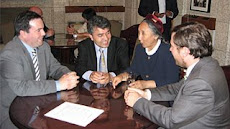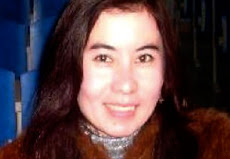By PETER WORTHINGTON

Word out of China is that Canadian citizen Huseyin Celil, 37, has been sentenced to 15 years in prison for alleged terrorist activities.
Mohamed Tohti, president of the Uyghur Canadian Association, says Celil’s sister in Kashgar in northwest China phoned Celil’s wife, Kamila Telendibaeva, in Burlington and said police had told her he had been sentenced to 15 years in Bajianghu Prison in the Xinjiang provincial capital of Urumqi.
“This is the first news we’ve heard of Mr. Celil,” said Tohti. “The Chinese government is obligated to first tell the Canadian embassy of the sentence, but instead they informed his sister, Heyrigul Celil, who used a public phone to call Canada rather than her home phone, which police monitor.”
Tohti said, “Police told her that since he insisted he was innocent, there will be another trial. She wasn’t even told the crime he was sentenced for.”
Celil was arrested last March while visiting his wife’s relatives in Uzbekistan and was extradited to China.
Although a Canadian citizen since coming here as a refugee in 2001 after escaping from China, the Canadian government wasn’t very interested in his case or his plight until his disappearance was publicized.
To this day, Canada’s diplomatic concern has been lukewarm, perhaps because of China’s considerable trade relations with Canada, or perhaps because China brands all Uighurs as terrorists linked with al-Qaida — which Tohti and all Uighurs vehemently deny.
Alim Seytoff, general secretary of the Uyghur American Association, said after 9/11 the Chinese intensified attacks on Uighurs (who are mindful of Tibetans in rejecting cultural genocide and seeking greater autonomy). China claimed to stand “side by side with United States in the war against terror” and used it to further persecute Uighurs.
The Uighur region of Xinjiang province once was known as East Turkestan. Tohti says the people are the most pro-Western of China’s minorities.
Seyoff says Uighur people “look to the United States as the model for human rights and democracy ... and regard the U.S. as a natural ally.”
He says Turkestan was the first democratic Islamic republic in the world in 1931-34, apart from Turkey.
The U.S. Commission on International Religious Freedom visited the region and was told by the Chinese of “al-Qaida elements” among the Uighurs. The commission found these claims “not to be credible.”
Recently the Chinese announced that 45 tonnes of “explosives, detonators and military paraphernalia” had been seized from Uighur “terrorists,” but this seems a fabrication focused on road-building dynamite and such.
China claimed “thousands of explosions and assassinations” in Xinjiang province throughout the 1990s. But in 2001, just prior to 9/11, Xinjiang governor Abdula Adurishit announced that the situation was “better than ever in history” and that record levels of investment were coming into the region.
Mohamed Tohti is frustrated at the Harper government’s apathy in this case. He points out that U.S. government pressure got and an American citizen, Rebiya Kadeer, freed after six years in a Chinese prison for allegedly “leaking state secrets.”
Her crime? Sending a local newspaper to her journalist husband in America. Her release preceded Secretary of State Condoleezza Rice’s visit to China last year.
Tohti, who escaped from Xinjiang in 1992 and has been trying to get his mother out ever since, doesn’t know what the second trial of Celil is all about, except that “he’s certainly not a terrorist” and our government seems unconcerned about his fate.
Article Source
To be continued ...





